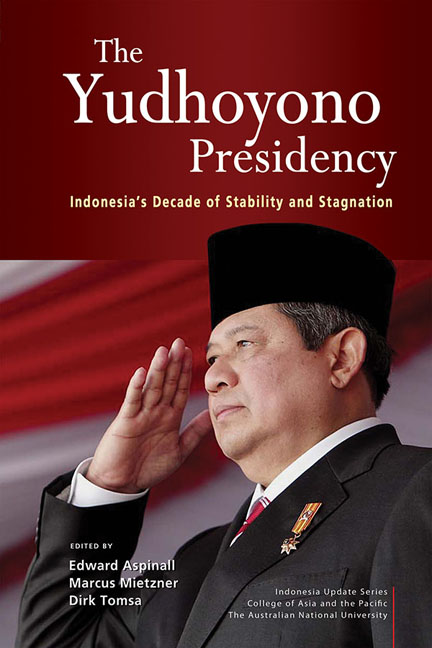Book contents
- Frontmatter
- Contents
- Tables and figures
- Contributors
- Acknowledgments
- Glossary
- 1 The moderating president: Yudhoyono's decade in power
- 2 Prologue Yudhoyono's legacy: an insider's view
- PART 1 PERSONAL, COMPARATIVE AND INTERNATIONAL PERSPECTIVES
- PART 2 INSTITUTIONS, POLITICS AND SECURITY
- 6 A balancing act: relations between state institutions under Yudhyono
- 7 Professionalism without reform: the security sector under Yudhoyono
- 8 Yudhoyono's legacy on internal security: achievements and missed opportunities
- 9 Toning down the ‘big bang’: the politics of decentralisation during the Yudhoyono years
- 10 The rule of law and anti-corruption reforms under Yudhoyono: the rise of the KPK and the Constitutional Court
- PART 3 GENDER, HUMAN RIGHTS AND ENVIRONMENT
- PART 4 THE ECONOMY AND SOCIAL POLICIES
- Index
- Miscellaneous Endmatter
8 - Yudhoyono's legacy on internal security: achievements and missed opportunities
from PART 2 INSTITUTIONS, POLITICS AND SECURITY
Published online by Cambridge University Press: 19 May 2017
- Frontmatter
- Contents
- Tables and figures
- Contributors
- Acknowledgments
- Glossary
- 1 The moderating president: Yudhoyono's decade in power
- 2 Prologue Yudhoyono's legacy: an insider's view
- PART 1 PERSONAL, COMPARATIVE AND INTERNATIONAL PERSPECTIVES
- PART 2 INSTITUTIONS, POLITICS AND SECURITY
- 6 A balancing act: relations between state institutions under Yudhyono
- 7 Professionalism without reform: the security sector under Yudhoyono
- 8 Yudhoyono's legacy on internal security: achievements and missed opportunities
- 9 Toning down the ‘big bang’: the politics of decentralisation during the Yudhoyono years
- 10 The rule of law and anti-corruption reforms under Yudhoyono: the rise of the KPK and the Constitutional Court
- PART 3 GENDER, HUMAN RIGHTS AND ENVIRONMENT
- PART 4 THE ECONOMY AND SOCIAL POLICIES
- Index
- Miscellaneous Endmatter
Summary
Managing internal security affairs is one of the most vital policy portfolios for any president, especially in countries with a long history of communal, political and separatist violence. For Susilo Bambang Yudhoyono, this area should have been his primary area of expertise, given his military background and his many years as the key government minister in charge of security affairs. Nevertheless, his commitment to find solutions was not always accompanied by direct personal involvement or the necessary expenditure of political capital. Three of the biggest internal security problems confronting Yudhoyono when he took office in 2004 were the insurgency in Aceh, violence in Papua and terrorism. Generally, he has been given high marks on the first and the third, and credit for at least trying on the second (MacIntyre and Ramage 2008). On all three, however, he could have done much more. He was generally reactive rather than proactive, letting external events force policy changes rather than providing clear strategic direction. He liked setting intellectual guidelines, but rarely did any of the heavy lifting himself. The opposite of a micromanager, he was happy to leave implementation to subordinates. He was often more interested in form than in substance, using the creation of new institutions as proof of commitment without the necessary follow-up to ensure they actually worked. At no point during his two terms was there any attempt to step back and look at security policy in a way that assessed overall needs and developed capabilities accordingly.
Yudhoyono has received the most praise on Aceh, not only for the 2005 peace agreement but for also ensuring that the peace was main tained. Indeed, his first vice-president, Jusuf Kalla, had for some time been actively seeking contact with the leadership of the Free Aceh Movement (Gerakan Aceh Merdeka, GAM). Yudhoyono, as president, was open to pursuing international mediation, and it could be argued that he was proactive during his first few months in office. But without the 26 December 2004 tsunami to give peace-making a new impetus and urgency, Yudhoyono's habitual dithering would almost certainly have led to endless discussions without a clear resolution. Instead, with Kalla in charge of the government negotiating team, an agreement was signed in Helsinki in August 2005 after just five formal meetings.
- Type
- Chapter
- Information
- The Yudhoyono PresidencyIndonesia's Decade of Stability and Stagnation, pp. 136 - 154Publisher: ISEAS–Yusof Ishak InstitutePrint publication year: 2015

